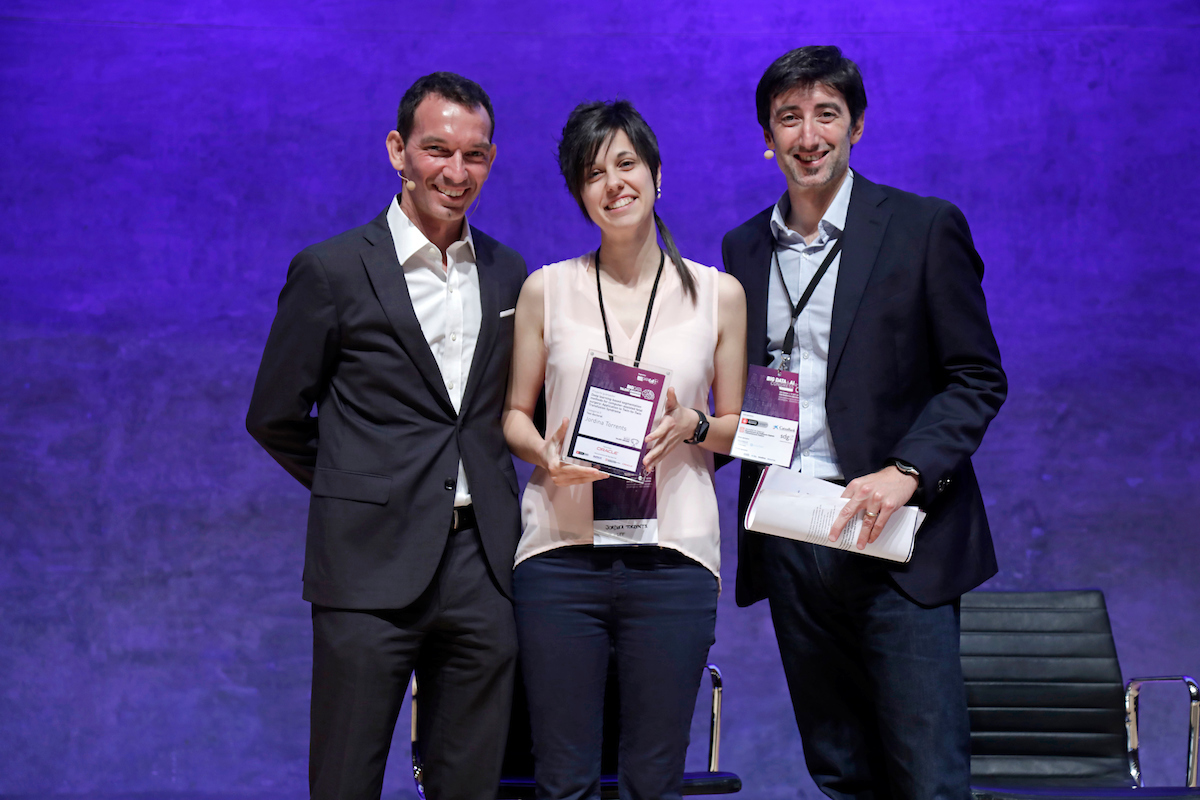Jordina Torrents awarded a prize for the doctoral thesis she is to defend in December at UPF
Deep learning-based segmentation methods for computer-assisted fetal surgery: Application to Twin-to-Twin Transfusion Syndrome is the study which has won her a Big Data & IA Award 2019 which was delivered in the course of the fifth edition of the Big Data & AI Congress held in Barcelona on 17 October.

On 17 October, Jordina Torrents was awarded for her doctoral thesis entitled Deep learning-based segmentation methods for computer-assisted fetal surgery: Application to Twin-to-Twin Transfusion Syndrome at the 5th edition of the Big Data and AI Talent Awards 2019 at the Big Data & AI Congress, a benchmark event in the field of big data analysis and artificial intelligence organized by Big Data CoE held annually in Barcelona. The main aim of the awards is to recognize works that have a major socio-economic impact and are technologically innovative in the fields of data analysis and artificial intelligence.
“Although it is another important step in my career, for me it has been a great personal satisfaction. This recognition will always remind me of three very intense years of work on a project that has not stopped growing and has posed new challenges that were not initially described and have had to be addressed in a matter of months”, Torrents says.
Jordina Torrents has worked for three years on her doctoral thesis which, under the supervision of Miguel A. González Ballester, an ICREA research professor with the Department of Information and Communication Technologies (DTIC) and director of the Simulation, Imaging and Modeling for Biomedical Systems (SiMBioSys) Research Group, she will be defending on 9 December at Pompeu Fabra University.
“It has been quite a personal experience working in a cutting-edge scientific environment in the field of medicine and artificial intelligence, where the “pressure of the end product” has also been present at all times”
Cutting-edge technology in fetal surgery
Jordina Torrents’s research focuses on building specific 3D models and computational tools for planning and navigating during fetal surgery. She works in the areas of image processing, computer vision, artificial intelligence, machine/deep learning and software systems development for planning and navigating during surgery.
Her research focuses on building specific 3D models and computational tools for planning and navigating during fetal surgery
Her thesis involves developing algorithms based on deep learning for the detection and segmentation of fetal structures in magnetic resonance imaging and 3D ultrasound. In her research, special attention is given to monochorionic twins affected by twin-to-twin transfusion syndrome (TTTS). The thesis proposes the first platform for planning and simulating TTTS fetal surgery that incorporates new techniques of artificial intelligence in a flexible C++ and MITK software application. It also poses the first prototype of navigation and intra-operative guidance taking planning into account.
Both software programmes allow fully exploring the intrauterine environment simulating the fetoscope camera and laser ablation, helping to determine the best entry point for the fetoscope to the womb and training surgeons’ movements and approaches prior to the operation.
“It has been quite a personal experience working in a cutting-edge scientific environment in the field of medicine and artificial intelligence, where the “pressure of the end product” has also been present at all times. Obviously, the greatest satisfaction for me is not the prize itself, but that all the work done is still being evaluated in the clinical setting, improving and being implemented during the coming years”, Torrents added.
Synergies between academia and enterprise towards research with a social impact
Currently, Jordina Torrents is completing a doctoral stage at King’s College London (UK) and her interests for the lie future mainly in research that has the chance to bring about an immediate impact on society: “This drive to always improve existing solutions in order to create social “impacts” is something I don’t see so clearly in academia, although there are more and more synergies (projects) between academia and enterprise”, she confesses. “However, in academia there is great freedom to explore new concepts and pathways that could end up in a new discovery. In industry, this freedom is obviously reduced”, she concludes. So, with a view to the immediate future she plans to find an intermediate research-enterprise environment in which to develop her professional skills yet further.
Reference work:
Jordina Torrents Barrena (2019), Deep learning-based segmentation methods for computer-assisted fetal surgery: Application to Twin-to-Twin Transfusion Syndrome, unpublished doctoral thesis which she will be defending on 9 December at Pompeu Fabra University, supervised by Miguel A. González Ballester. Big Data and AI Talent Awards 2019 prize.
